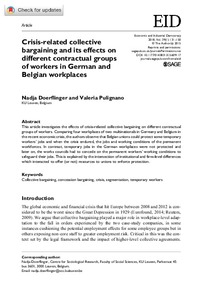Crisis-related collective bargaining and its effects on different contractual groups of workers in German and Belgian workplaces

Doerflinger, Nadja ; Pulignano, Valeria
Economic and Industrial Democracy
2018
39
1
February
131-150
collective bargaining ; economic recession ; temporary worker ; trade union ; labour relations ; comparison
Collective bargaining
http://dx.doi.org/10.1177/0143831X15609117
English
Bibliogr.
" This article investigates the effects of crisis-related collective bargaining on different contractual groups of workers. Comparing four workplaces of two multinationals in Germany and Belgium in the recent economic crisis, the authors observe that Belgian unions could protect some temporary workers' jobs and when the crisis endured, the jobs and working conditions of the permanent workforces. In contrast, temporary jobs in the German workplaces were not protected and later on, the works councils had to concede on the permanent workers' working conditions to safeguard their jobs. This is explained by the intersection of institutional and firm-level differences which interacted to offer (or not) resources to unions to enforce protection."
Digital
The ETUI is co-funded by the European Union. Views and opinions expressed are however those of the author(s) only and do not necessarily reflect those of the European Union or the ETUI.